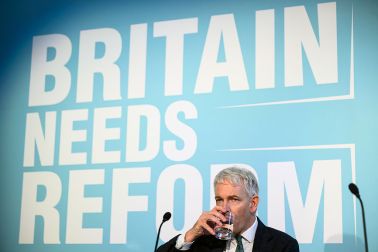People have often said that George Osborne is ‘very political’ and have not meant it as a compliment.
People have often said that George Osborne is ‘very political’ and have not meant it as a compliment. But it is, in principle, a good thing that politicians should be political (see what happens when they’re not). To understand the Cameron/Osborne political success, you need to see how quickly they have changed. A year ago, think-tanks like my own dear Policy Exchange were saying that the deficit should be cut, over the parliament now begun, by £100 billion in real terms. This was considered intolerable in polite society. In the same week, Andrew Lansley, now the Health Secretary, made a ‘gaffe’ in which he said that, with Health ‘ring-fenced’, other departmental budgets would have to be cut by 10 per cent. From that point, the Tories began surreptitiously to move, and on Tuesday Chancellor Osborne promised exactly that previously unthinkable real-terms deficit reduction, and departmental cuts of 25 per cent. He has managed to do this with his party still being attacked from the right for being soft, and with the Liberal Democrats, forced by their longing for power, backing him. He presented it well: it is a great political success. One should add, though, that Labour, being in opposition, is now free to ‘see through’ the Tories’ game, and try to mobilise millions of people to revolt. The assault proposed on the public sector is, quite rightly, massive — much bigger than anything ever done by Margaret Thatcher. It is hard to see why what is coming will not be as fierce a fight as anything known in the 1980s.
In the Labour leadership contest caused by the resignation of Harold Wilson in 1976, there were six candidates. Five of them — Roy Jenkins, Tony Crosland, Denis Healey, Tony Benn and Michael Foot — went to Oxford. Labour wisely chose the only one without a university degree, Jim Callaghan. Nowadays, unfortunately, it is almost impossible to find a politician who is not a graduate, and this is the case with the current Labour contest. So it is a straight fight between Oxford and Cambridge — Ed Miliband, David Miliband and Ed Balls versus Andy Burnham and Diane Abbott. I remember meeting Diane Abbott at Cambridge, where she was two or three years above me. At that time, she was jolly, and not at all proletarian or disadvantaged: it was only later that she realised one must appear downwardly mobile in order to rise to the top. When one thinks of what great universities do for their alumni, the ingratitude of modern leaders is utterly scandalous. Tony Blair (St John’s) never lifted a finger to help Oxford. Ed Balls (Keble) delighted in Gordon Brown’s trashing of Magdalen over the Laura Spence case. All five of the candidates drone on against the ‘elitism’ of which they are beneficiaries. All five of them favour education policies designed to degrade the standards which helped them so much.
Perhaps this is the result of the concept of ‘meritocracy’. In theory, it is obviously a good thing if merit rises to the top, but one unhappy side-effect is that people who have succeeded in a meritocracy tend to have such a belief in their own merit that they make little allowance for gratitude to those who helped them or for sheer luck. If you think you are brilliant, you may imagine that parents, schools, universities, colleagues had nothing to do with your rise. I know a touching example of the opposite in a friend who got into Cambridge from public school in the 1950s without even having to take an exam, and felt that he hadn’t deserved it at all. He has a huge reverence for the dons who put up with him. By way of thanks, he nowadays endows scholarships there for overseas students. He also regards his degree as unmerited. He had done no work, he says, and realised, two weeks before the exams, that this was an emergency. He found a hack tutor to cram him for the papers and offered him £1,000 (an enormous sum in those days) if he got him a first, £800 if he got him a second, and £500 for a third. He got a third, and thought it cheap at the price.
I learn from Philip Ziegler’s new biography of Ted Heath that, in the run-up to the February election of 1974, Heath was asked to contribute a favourite dish to a book of such things chosen by the famous. His Labour rival, Harold Wilson, contributed Cornish pasties with brown sauce. Heath offered lobster thermidor with two wine sauces. In theory, this makes him an admirable contrast to Wilson’s pandering to low taste, gloriously reckless when he was just about to take on the miners at the polls, Churchillian in his love of extravagance. But it seems that it simply had not occurred to Heath that there might be a problem. When his political secretary, Douglas Hurd, remonstrated with him, he replied ‘loftily’, ‘I can see no real harm.’ These politicians who proudly resist any consideration of their ‘image’, on the grounds they are better unspun, are a menace.
Poor Ziegler wrestles manfully with the fact that Heath was very hard to like. Once, when editing the Daily Telegraph, I had a run-in with Sir Edward, who was displeased about a diary item we had published. He initiated a correspondence, listing many complaints. Here is one paragraph from his third letter: ‘Second, what you describe as the “jocular context” in fact led your readers to believe that I was a self-centred, selfish personality, who surrounded himself with paintings of himself or, in your revised version, with photographs of myself. This is not acceptable.’ No one reading Philip Ziegler’s book — scrupulous, even friendly though it is — could conclude that what we had ‘led our readers to believe’ was wide of the mark.
On midsummer night I left our curtains open, and let the waxing light of the moon into the bedroom. Lying there, looking out over the silver fields, I wondered about Shakespeare’s inspiration from that same night. The writing about nature in A Midsummer Night’s Dream is lush and full, as if he were excited to be tackling a subject previously treated more formulaically. My learned wife pointed out his very exact powers of observation. When Titania embraces Bottom (‘Sleep thou, and I will wind thee in my arms’), she makes a comparison: ‘So doth the woodbine the sweet honeysuckle/ Gently entwist’. By ‘woodbine’, Shakespeare means, in this context, what we call bindweed. Bindweed grows anti-clockwise, honeysuckle clockwise, so opposites entwine. Flanders and Swann make the same play in their song ‘Misalliance’, in which bindweed embraces honeysuckle, to the shock of Honeysuckle’s parents: ‘The Bindweeds,’ they cried, ‘are inferior stock,/ They’re uncultivated, of breeding bereft;/ We twine to the right — and they twine to the left.’






Comments